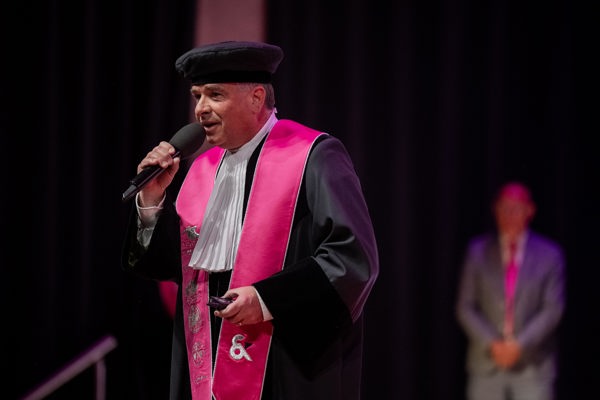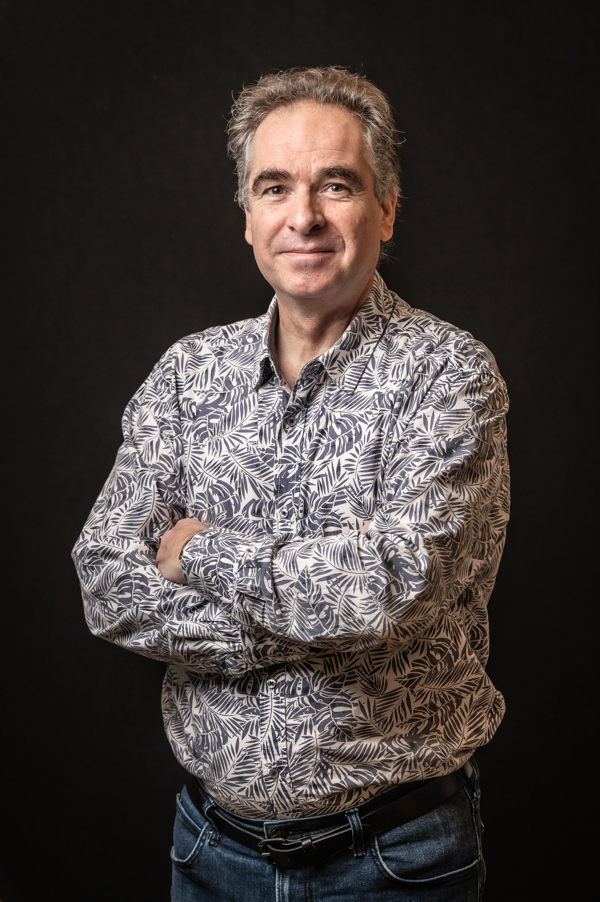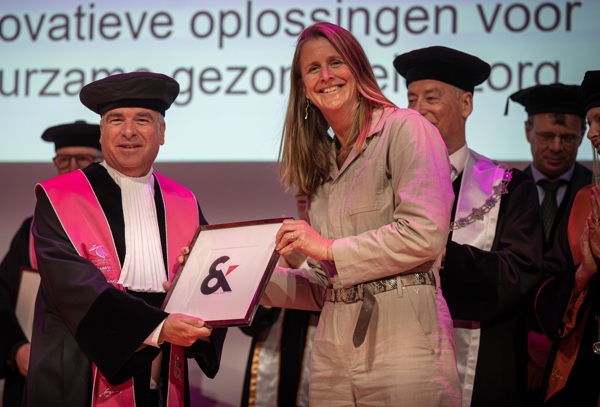Appropriate care and support for vulnerable elderly requires good coordination between all parties involved and the older adults themselves. Prof. Dr. Robbert Gobbens therefore works together with healthcare professionals and care users to integrate technology and innovation into existing care pathways.
"What motivates me is building something together that truly makes an impact. Not just in terms of knowledge, but especially in practice."
Robbert Gobbens is Professor of Health and Wellbeing of Vulnerable elderly at Inholland University of Applied Sciences. In addition, he is Special Professor of the Professionalization of Nursing and Care in Elderly Care at Tilburg University. This year, he was appointed Medical Delta Professor.
You have been appointed Medical Delta Professor. What does that mean for you?
"I consider it an honor, especially that I was put forward by Inholland University of Applied Sciences. That’s really great. I’ve been active within Medical Delta for years, so the collaboration is not new to me. When this opportunity came up, I certainly didn’t say no.
For four years, I have been the leading professor of a Medical Delta Living Lab. We started under the name 'Geriatric Rehabilitation@Home' and focused on geriatric rehabilitation. Our main focus was on the development of e-health applications that promote home rehabilitation for the elderly. We have now entered a new phase, and the name of the lab has changed to 'Blended Rehabilitation.' The focus here is more on integrating technology and innovation into conventional rehabilitation pathways.
The appointment as professor feels like the cherry on top, but it’s more than that for me. I bring my specific expertise, particularly in the area of the elderly and vulnerable elderly. I also have a background as a nurse, which is not very common within Medical Delta. Medical Delta Professor AnneLoes van Staa is one of the few who shares that same background. I really hope that with my appointment, I can contribute that practical knowledge and experience from higher education. In addition, it offers me the chance to expand my network and actively use it in the joint execution of projects."
Can you briefly tell us what your area of expertise is?
"My expertise lies with vulnerable elderly individuals. In 2010, I obtained my PhD at Tilburg University on this topic. During my doctoral research, I developed the Tilburg Frailty Indicator (TFI), a tool to assess frailty in the elderly.
I worked as a community nurse for about ten years and am still active within the professional association Nurses & Caregivers Netherlands (V&VN). Although I no longer work at the bedside, I am still a nurse at heart and soul. I bring that practical knowledge and involvement into my work within Medical Delta.
I find quality of life extremely important, and that goes beyond just physical functioning.
In addition, I am a professor at Inholland University of Applied Sciences, in collaboration with Zonnehuisgroep Amstelland. My professorship focuses on the health and wellbeing of vulnerable elderly people. I find quality of life extremely important, and that goes beyond just physical functioning. Social functioning plays a significant role as well. How many social contacts does someone have? Is there enough social support? The living environment also plays a part. I advocate for a broad perspective on people’s functioning."
The healthcare system is increasingly under pressure. What transition do we need to undergo, and how can your research contribute to that?
"When we talk about the pressure on the healthcare system, I first think about the position of the professionals, particularly nurses and caregivers. I believe they are not receiving enough attention and appreciation at the moment. Not only financially, but also in terms of recognition for the work they do. Much more needs to be listened to them, and they should have more say in matters. I’m sure this would improve their work and job satisfaction, and contribute to retaining these professionals in healthcare.
We therefore need to invest in an attractive work environment. We are trying to do this through learning and innovation networks, in which nurses also actively participate. This ensures challenging work that aligns well with the competencies people have. However, this still happens too infrequently because the daily grind takes over. The focus is mainly on getting the planning done. Operational management and organization take precedence, which causes the content of the work and the perspective of the healthcare professional to be sidelined. We need to change that."
Medical Delta bridges the gap between scientific disciplines, but also between science and practice. Why is that important?
"Within the Medical Delta Living Lab Blended Rehabilitation, various disciplines and organizations come together. We started about five years ago with three universities of applied sciences, and now Leiden University of Applied Sciences has also joined. In addition, we collaborate with three healthcare organizations: Omring, Pieter van Foreest, and Basalt. We are also increasingly making strides towards vocational education (mbo). I see this as an important development.
We now have a practor as a permanent part of the living lab, and hopefully, mbo teachers and students will join in soon. And that’s essential. Especially when it comes to rehabilitation in the nursing home setting, because that’s where mostly mbo-trained healthcare professionals work. So, they must be involved in innovation and research from the start.

We want mbo students to gain experience in rehabilitation and technology. They are the ones who will ultimately shape blended rehabilitation in practice. This requires a lot—not just from the patients, who need to be willing to use new technology, but certainly also from the healthcare professionals. They need to be well-integrated into the process.
One example of innovation in our lab is the program 'Ik oefen zelf' ('I practice on my own'), where patients receive exercises they can do whenever and wherever it suits them. We want to give this a good place in the rehabilitation process, so it works for both the patients and the professionals."
What is it like to start collaborating with someone from a completely different discipline?
"In the beginning, within our living lab, we really needed time to get used to each other. Honestly, I had expected it to be different. Everyone had their own idea of what the living lab should exactly be. Moreover, we started right away with three universities of applied sciences and two healthcare organizations, so many parties were involved. It definitely took us about a year to get used to each other and to create a roadmap together with clear steps and goals. It was quite a long, but necessary process.
We’ve now completed the first four years and know what we can rely on with each other and how we can strengthen one another. Because of that, we can now really make progress. I’m also glad that we’ve received funding for another four years. If we had had to stop after all this time of building, I would have found that extremely unfortunate."
What motivates you to collaborate with others outside your field of expertise?
"I just really enjoy it. I need enthusiastic people around me, and it doesn’t matter whether they are within my field or outside of it. What motivates me is building something together that truly makes an impact—not only at the knowledge level, but especially in practice. That’s also what my professorship is about: conducting research that contributes to solving issues from the field.
What motivates me is building something together that truly makes an impact—not only at the knowledge level, but especially in practice.
One example is the PLINT project, where, together with nurses and students, we researched how to better identify and prevent malnutrition in older adults living at home. Based on a literature review, we selected a tool that is highly applicable in practice.
Another great example is the project 'Seeing the Person Who (Also) Has Dementia.' This focuses on practical tools for better care for people with dementia, especially in the nursing home setting. Together with caregivers, people with dementia, and their loved ones, we look at where the challenges are in practice and what can be improved to provide better care for people with dementia and their families. Projects like these really show me why collaboration between disciplines and with practice is so important. This is how you truly make a difference."

What will a (potential) patient, (healthcare) professional, or Dutch citizen notice about your work and this collaboration in the future? What do you hope to have achieved for them in five years?
"I hope that in five years, we will have truly made a difference for both patients and healthcare professionals. On one hand, I want patients to be able to recover well, in a way that suits them, and for them to be satisfied with the process. I want us to use technology in a way that helps them in their rehabilitation. On the other hand, I want healthcare professionals to have clear guidelines for applying blended rehabilitation. I want them to know what works, what is feasible, and how they can integrate technology effectively into their daily practice. If we can achieve that, I will be very satisfied."
With the new programming, Medical Delta places the needs from practice at the forefront. How do you incorporate the needs of healthcare practice into your research?
"For me, it’s very logical to collaborate with practice. That has always been the starting point of my professorship: what is happening in practice, and how can we contribute with research? The people from practice are involved from the very beginning and help think through the research we’re going to conduct.
For those who find this less obvious, I would advise: if you have a good idea for research, test it directly in practice. See if it’s relevant to pursue, and involve the target group right from the start. That way, they can contribute ideas and input. Because in the end, everything we develop must actually land in practice."
You will probably meet more researchers, but also practice partners, from other disciplines and institutions now. Who has really stood out to you, and why?
"There are so many people I could mention; it’s difficult to choose. But the first one that comes to mind is my supervisor, Jos Schols. I’m still in contact with him, even though he’s now retired. He has always provided me with valuable advice. We’re also currently on a committee together for Alzheimer Nederland.
In healthcare, Nelleke Vogel is someone who has really stood out to me. She was a director at Zonnehuisgroep Amstelland. Like me, she is a nurse at heart and soul, and she places great importance on involving practice in research. As a director, she would often go into practice herself—walking alongside staff, listening, and being visible. That made a huge impression on me."
What experiences or lessons you gained as a community nurse do you still carry with you?
"The most important experience for me is looking at the functioning of people in a broad sense and truly listening. Sometimes people ask a question, but there’s something entirely different behind it. You have to be able to figure out what that person really needs. Good communication skills and active listening are essential in that process.
I was a community nurse for about ten years. You visit people in their homes, in their own environment, and that provides so much extra information. It’s not just about health, but also about what someone needs to live the best life possible. That broad perspective on the physical, but also on the social aspects and the living environment, has become second nature to me.
I was a community nurse for about ten years. You visit people in their homes, in their own environment, and that provides so much extra information.What I always found fascinating was the great diversity of situations. I regularly had contact with general practitioners or people in the social domain. That enriched the work. I remember a man with Bechterew’s disease, a form of arthritis. He was quite short of breath and had a huge Bouvier dog that was tied to the couch when I visited. But the dog was so strong that it would pull the whole couch with it. The coffee was terrible, and the house wasn’t well-kept. The situation in his home was not conducive to his health. In such cases, you need to think: what can I do with this, and how can I handle it in the best possible way?
I’m really happy I did that work, and that I have that experience in my backpack. I no longer have to be at the bedside. I consciously chose education, and research has more or less come my way. That’s what I’m focused on now."
What do you need from others, what is still missing in your collaboration to achieve your goals? What call to action would you like to make?
"I would like to establish new contacts outside the living lab. That has a lot of added value for me.
Even outside of Medical Delta, I see many great initiatives, but sometimes they still feel like isolated islands. Take, for example, research on geriatric rehabilitation or people with dementia. A lot is already happening, but we could be doing much more together. Collaboration is already happening within the dementia professor network PRODEM, and we are also making strides with the Academic Workgroup for Elderly Care at Tranzo - Tilburg University. However, I believe there is still a lot to be gained. My call to action is: seek each other out, collaborate, and share your knowledge."

